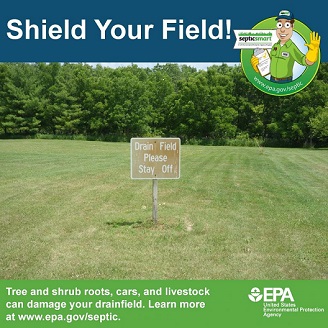
A drip dispersal system consists of a series of ½” diameter drip tubing installed at a shallow depth of 6-10” below the ground surface. It is designed to effectively disperse the treated effluent that comes from your septic tank. The drip line in the ground disperses wastewater with a combination of soil absorption and plant uptake. Your drip dispersal system will function for many years with only minimal maintenance being required, provided you follow these manufacturers recommendations.
1. Plant grass or other vegetation over the drainfield that has shallow root growth. This will stabilize the soil and help absorb water.
2. Do not discharge sump pumps, footing drains or any other sources to the system.
3. Maintain all plumbing fixtures to prevent excess water from entering the system.
4. Do not drive cars, trucks or other heavy equipment over the drip dispersal field. This can damage the drip components or the soil and cause the system to malfunction. Lawn mowers, rubber wheeled garden tractors and light equipment can be driven over the drip field.
5. Do not drive tent stakes, golf putting holes, croquet hoops etc., into the dispersal field.
6. Contact your service company if your high water alarm should sound. The pump chamber is sized to allow additional storage after the high water alarm sounds but you should refrain from excessive water usage (i.e., laundry) until the system has been checked.
7. After a temporary shut down due to a vacation or other reason, the treatment plant ahead of the drip field filter initially may not function effectively. The lack of nutrient intake can result in the filter blocking which will have to be removed and cleaned.
8. Contact your service company if you notice any areas of excessive wetness in the field. In most cases, this is usually caused by a loose fitting or a nicked dripline and can be easily repaired. Note: There may be some initial wetness over the dripline following the system’s installation. This should cease once the ground has settled and a grass cover is established.
9. Know what you can and can not put into your septic system. It is not a trash can and does not like harsh chemicals.
10. Please call us at 855.329.4519 if you have any questions about your system.